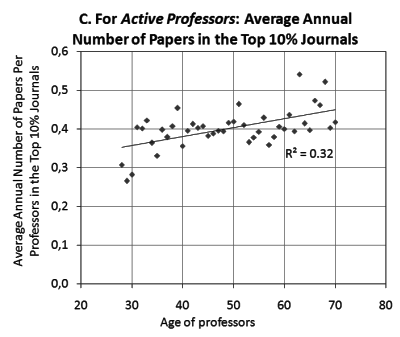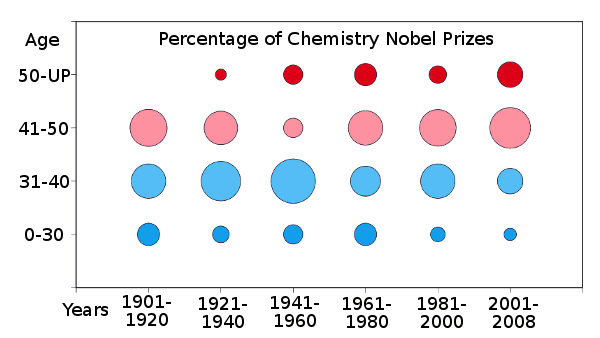Superannuated Scientists
December 20, 2011
Everyone is familiar with the
quotation by
Douglas MacArthur, "...Old soldiers never die; they just fade away."[1] This quotation has led to quite a few topical variations that include the following relating to STEM fields:[2-3]
• Old mathematicians never die, they just lose some of their functions.
• Old mathematicians never die, they just become irrational.
• Old chemists never die, they just fail to react.
• Old chemists never die they just reach equilibrium.
• Old laser physicists never die, they just become incoherent.
• Old electrical engineers never die, they just have slower rise times.
Modern
corporations tend to discount the abilities of their older
scientists,
engineers and
technologists. The Internet abounds with
anecdotal evidence of the indignities suffered by older employees.
Software companies, in particular, seem to flush out older employees, by one tactic or another. In that industry, "older" translates to mid-thirties. The prejudice is that older technologists don't possess the right skill set because the pace of
innovation is so rapid.
Philosopher of science,
Thomas Kuhn, the author of the influential book, "
The Structure of Scientific Revolutions," believed that revolution in science was forged by younger scientists. An analysis of his
hypothesis showed, instead, that
middle-aged scientists, and those scientists who jump into a new field from another, are the true
revolutionists.[4]
One study, published in 1990, investigated the affects of age and scientific productivity at
Norwegian universities. The study found that the rate of an individual's
scientific publication peaked at 45–49 years, and then it declined by 30% for researchers older than sixty.[5] Researchers in fields such as the
social sciences and the
humanities, in which change happens at a slower pace, were more immune from obsolescence than
natural scientists. Productivity declined continually with age for natural scientists, at least for those in Norwegian universities.[5]
Later studies have refuted this finding that scientists older than about 45 are less productive.[6] A recent study of 13,680
university professors in
Quebec found that scientific productivity rises sharply between 28 and 40. It then increases more slowly between 41 and 50, but it then stabilizes from age fifty to
retirement for the more industrious researchers. When "
high impact" publications are considered, researchers older than 55 are still holding their own, as the figure shows.[7-8]

Publication rate in the top 10% journals as a function of author age.
Fig. 4c of ref. 8.
(Via arXiv Preprint Server).[8])
Benjamin F. Jones, an
economist at
Northwestern University, and
Bruce A. Weinberg, an economist at
Ohio State University, have looked at the average age at which
Nobel Laureates did their
prize-winning work.[9-11] For their dataset, they included all the Nobel Laureates in
physics (182),
chemistry (153) and
physiology and medicine (190) from 1901-2008, or 525 total. The hard part, of course, was determining the age of the laureate at the time of the cited work, not the age at award.[11]
Their findings, published in a recent issue of the
Proceedings of the National Academy of Sciences,[9] show that the majority of Nobel Laureates in Chemistry from 1901 to 1960 did their prize-winning work by age 40. After 1960, chemistry laureates were more likely to have done their prize-winning work after age 40.[9].

Age at which cited work was done for the Nobel Chemistry Prize. The size of the bubbles indicates percentage. There's a slight trend in favor of older chemists. (Plot via Gnumeric).
Bruce Weinberg, co-author of the study, says that the effect is more apparent in
physics.[11]
"Today, the average age at which physicists do their Nobel Prize winning work is 48. Very little breakthrough work is done by physicists under 30."
Rather than applaud the innovation of the older scientists, the economists place the blame on diminished innovation by younger scientists. They state that young scientists may be spending too much time in training, as students and
postdocs. It's only after this lengthy training phase that they can pursue their own research.[10]
Physics had one confounding factor, that young
theoreticians skewed the
statistics to lower age during the initial definition of
quantum mechanics.
Experimental physics, for which experience is an advantage, is an older scientist's game.[10] I guess it's good that I'm an
experimentalist.
Seventy-four year old
Roald Hoffmann, who won the 1981
Nobel Prize in Chemistry for theoretical work on chemical reactions that he did in his twenties, had this to say about the study results.[10]
"My memory may not be as good, but my intuition is better. I'm much better at making connections now than when I was young."
References:
- Douglas MacArthur sound bite, via Wikimedia Commons, Ogg Vorbis format.
Douglas MacArthur was very popular, so much so that people would name their children after him. This brings me to recall one of my favorite baby naming jokes.
A couple, named MacArthur, were proudly presenting their toddler to a visitor.
"This is General Douglas MacArthur," said the mother.
"Hello, Douglas," the visitor said while patting the little boy on the head.
"No," said the father, "His middle name is Douglas. His first name is General."
- Funny Math Quotes, Online Math Learning Web Site.
- Joachim Verhagen, Science humor.
- K. Brad Wray, "Is Science Really a Young Man's Game?" Social Studies of Science, vol. 33, no. 1 (February, 2003), pp. 137-149.
- Svein Kyvik, "Age and scientific productivity. Differences between fields of learning," Higher Education, vol. 19, no. 1 (1990), pp. 37-55.
- Wolfgang Stroebe, "The graying of academia: Will it reduce scientific productivity?" American Psychologist, vol. 65, no. 7 (October, 2010), pp. 660-673.
- Geoff Brumfiel, "Older scientists publish more papers," Nature News, October 28, 2008.
- Yves Gingras, Vincent Lariviere, Benoit Macaluso and Jean-Pierre Robitaille, "The effects of aging of scientists on their publication and citation patterns," arXiv Preprint Server, October 23, 2008.
- Benjamin F. Jonesa and Bruce A. Weinberg, "Age dynamics in scientific creativity," Proc. Natl. Acad. Sci. vol. 108, no. 47 (November 22, 2011), pp. 18910-18914 .
- Bethany Halford, "Scientists Are Doing Their Most Creative Work Later In Life," Chemical and Engineering News, vol. 89, no. 49 (December 5, 2011), p. 39 .
- Scientific productivity increases with age, Northwestern University Press Release, November 10, 2011.
Permanent Link to this article
Linked Keywords: Quotation; Douglas MacArthur; corporation; scientist; engineer; technologist; anecdotal evidence; software; innovation; philosopher of science; Thomas Kuhn; The Structure of Scientific Revolutions; hypothesis; middle-aged; revolutionist; Norwegian; university; scientific publication; social sciences; humanities; natural scientist; university professor; Quebec; retirement; high impact; arXiv; Benjamin F. Jones; economist; Northwestern University; Bruce A. Weinberg; Ohio State University; Nobel Laureate; Nobel Prize; physics; chemistry; physiology and medicine; Proceedings of the National Academy of Sciences; chemist; Gnumeric; physics; postdoc; theoretician; statistics; quantum mechanics; experiment; experimentalist; Roald Hoffmann; Nobel Prize in Chemistry.